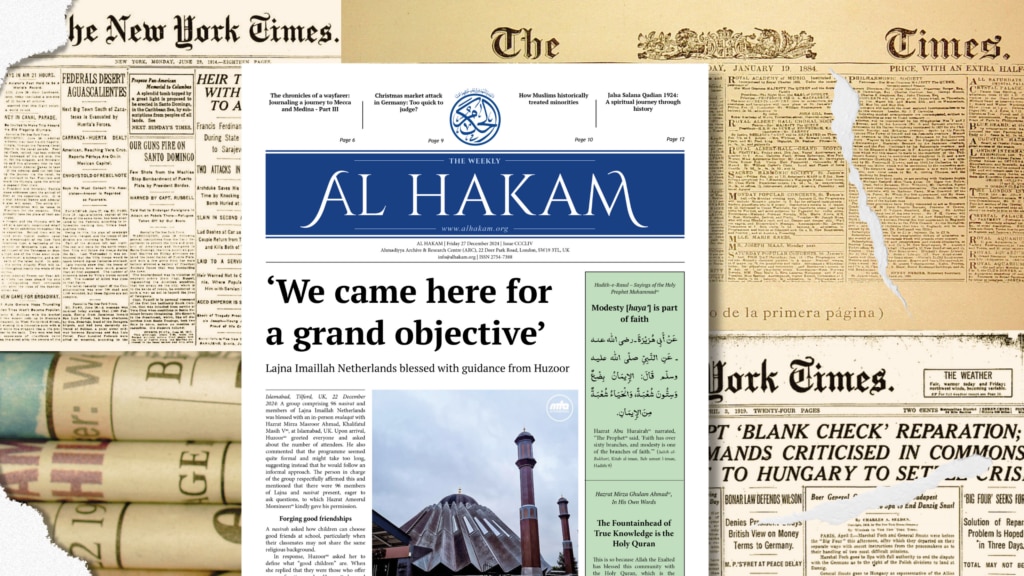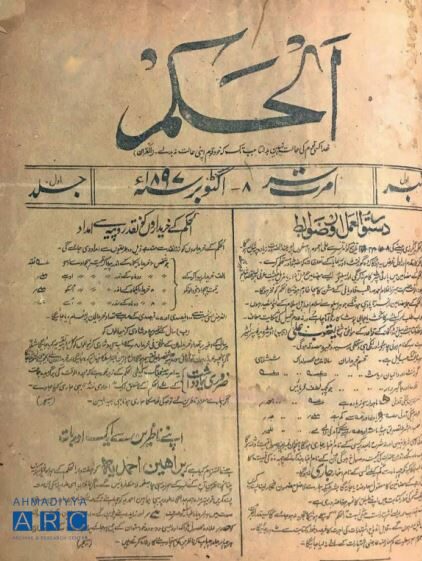Nauman Ahmad Hadi, Missionary, Wakalat Tasneef, UK

News, and newspapers, are not hard to come by. Some newspapers are seen as stalwarts – almost like an ancient country manor that has witnessed much history. It stands proud surrounded by the well-maintained grass of decades of respectability earned through reporting the happenings from around the world to millions. It is not that it has only seen the rise and fall of empires, revolutions, and events that shocked humanity – but the house has been the storyteller and, for most part, the soul behind many a history that is written by the historians. The very names of newspapers, just like ancient stately homes, are currency.
Yet behind the polished windows of this grand Country Manor – a Downton Abbey of sorts – peers out, at times, a sinister figure. You can see it observing you through a tall window as you study its lines – its bricks and mortar – but all the while it actually watches you to ensure the effect of the edifice before you is precisely of the narrative it has weaved.
Sometimes it reports facts. Sometimes, lies dressed as facts.
Thus, are, in my opinion, many newspapers and media organisations. They are established decades or centuries ago, they are well presented, articulate, and persistent in publishing their content which is consumed by the masses. But they are forbidding – like the ancient Elizabethan manor, like the caves of Ashab-e-Kahf – especially to that which they see contrary to their interest. You may only ever stand and gaze upon its magnificent building: entry is for few, those who are adept at spinning the yarn that shall weave the storyline that goes in favour of the Lord of the Manor. You shall have to take on the garb of a servant: the livery of its master, shedding in the process the cloak of your own conviction.
But Al Hakam is different.
Al Hakam opened its eyes in a world where the storm of publications was already fierce. So fierce in fact, that this tempest had overcome the Muslim world. It was easy, in such an atmosphere, for many periodicals to succumb to the narrative of counter-Islamic influences and present Islam – not the Muslims, but the theology of Islam itself – as needing to change with the times. It is interesting to note that even today anything that will come across as subverting the teachings of Islam: men and women offering Salat together in congregation without any segregation and Muslims altering basic tenets of faith is quickly picked up by the media. At times it is the only material some will publish. Such instances are championed as being causes for freedom. Similar to today, when Al Hakam was established in the latter part of the 19th century, this subtle wind of opposition was always blowing. Yet this periodical, after finding its feet stood its ground – and stood firmly. As it was then, we know it to be the same now. It was not until 2018 when it was relaunched in English by Hazrat Khalifatul Masih Vaa that we properly became acquainted with it. We went back to its ancient pages, sitting in archives around the world, to see who Al Hakam was.

Like a friend whose good qualities are part of his essence, who is not fazed by the tumults of life we found it to be. Ever smiling it is. Though you know of the deep pain it has seen, you can see its pages soaked with the ink that has had to describe in harrowing detail what it has had to witness. Nonetheless, it extends the Salam to you before you do to it. A warm companion and a dear friend it quickly becomes. One who you repeatedly go back to, looking for answers, finding it more handsome in countenance every time – the effect of God’s grace discernible on it. Its manners are like that of a nobleman who has fought hard battles, yet he prefers the obscurity that will be caused by telling the truth to the fame that will come by lies. Because of this, he quickly becomes the lens through which you see the world.
This was visible, and noticeably visible, during the Covid pandemic. Whilst other papers faced an identity crisis, we found Al Hakam rapidly progressing and growing. The entire English transcript of Friday Sermons of Hazrat Khalifatul Masih Vaa are published in Al Hakam, on a weekly basis, for the first time in history; news on other engagements of Huzooraa is quickly distributed bringing the entire Ahmadi world closer together; and when we observe significant events occurring in the world, the Islamic perspective to it promptly circulated.
The year 2024 began like any other, except that it was deeply personal for many with the war in Gaza beginning to gain speed and the war in Ukraine continuing. Muslims were desperately looking for solutions to what should be the proper Islamic response to the atrocities being committed. Al Hakam published article after article on this, creating a true and honest account based on the words of Hazrat Khalifatul Masih: Israel needed to stop the killing of innocent civilians, but the Muslim States were not entirely innocent either, they needed to do more to protect their fellow Muslims. Brave headlines in blue gave both comfort and hope but they did something more – outline a roadmap to peace for the future. Consequently, for many it has become, throughout the pandemic and ever since, an active daily diary of the Ahmadiyya Jamaat for the English-speaking world.
Whether it was commentary on documentaries or films being watched by millions and the reality behind them, books creating waves or one natural disaster after another, Al Hakam proved amply equipped at helping us penetrate the fog of uncertainty of everything that was occurring around us.
Later in 2024 came the upheaval in not just British politics but also the re-election of President Trump. The dramatic events around it, seemed at times, like a motion picture that was only brought to reality through the magnifying glass of words that now became events foretold by Prophets and their Khulafa.
Where others sought to tell stories, Al Hakam uncovered deeper meanings. Of course, the entire galaxy of Ahmadiyya literature helps, but since the majority of our literature is either in Arabic or Urdu, Al Hakam has become one of the means through which the Sun shall rise from the West illuminating these nations in a vernacular familiar to them. Al Hakam was praised by Hazrat Musleh-e-Maudra in the words that even if millions of rupees were spent, no other newspaper could ever attain its status. (Al Hakam, 14 January 1934)
The previous year has shown that Al Hakam is not a mere vessel of ink and paper, it is a symphony of truths – harmonising the heart’s desire to understand what we as a Jamaat believe about a particular topic, with an equally eloquent melody that has been sung by the orchestra of Ahmadi literature since the world first came to know of who the Promised Messiahas was.

